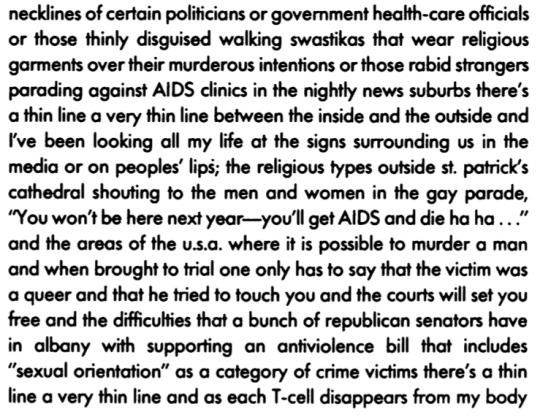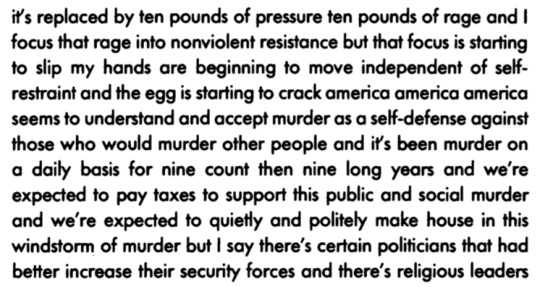Don't wanna be here? Send us removal request.
Text
Does anyone care about information like this?
I don’t know but I’ve moved to @flowersthatdiequickly
13 notes
·
View notes
Text
Restrictive and narrow conceptions of liberty derived from bourgeois constructions of the market, the atomizing and individualizing character of rights, and an equality grounded in sameness enabled and dissimulated the domination and exploitation of the postbellum order. Prized designations like “independence,” “autonomy,” and “free will” are the lures of liberalism, yet the tantalizing suggestion of the individual as potentate and sovereign is drastically undermined by the forms of repression and terror that accompanied the advent of freedom, the techniques of discipline that bind the individual through conscience, self-knowledge, responsibility, and duty, and the management of racialized bodies and populations effected through the racism of the state and civil society. Liberalism, in general, and rights discourse, in particular, assure entitlements and privileges as they enable and efface elemental forms of domination primarily because of the atomistic portrayal of social relations, the inability to address collective interests and needs, and the sanctioning of subordination and the free reign of prejudice in the construction of the social or the private.
Saidiya Hartman, Afro-Pessimism: An Introduction (pdf)
17 notes
·
View notes
Photo

Barragan House, by Luis Barragan, 1948, in Tacubaya, Mexico
3K notes
·
View notes
Link
if you want to look into a series of thoughts (afropessimism is not really a “school” of thought or “discipline”) that mirrors and maybe even silently, implicitly animates a lot of the ways we talk about blackness on this website, then I’d recommend reading this
746 notes
·
View notes
Photo

Kati horna / El botéllon, serie Paraisos Artificiales
35 notes
·
View notes
Quote
And my looking is a looking / primed, it is a looking to the power of itself, / and I see a sea folding inward, / 200 little seas folding on themselves—
Sharon Olds, from One Secret Thing: Poems; “Fly on the Wall in the Puritan Home,” (via violentwavesofemotion)
136 notes
·
View notes
Photo

Advertisements for Architecture 0142
996 notes
·
View notes
Quote
Lantern laws made the lit candle a supervisory device – any unattended slave was mandated to carry one – and part of the legal framework that marked black, mixed-race and indigenous people as security risks in need of supervision at night. In this way the lit candle, in a panoptic fashion, sought “to extend to the night the security of the day.” Any slave convicted of being unlit after dark was sentenced to a public whipping of o more than forty lashes, at the discretion of the master or owner, before being discharged. Later this punishment was reduced to no more than fifteen lashes. Such discretionary violence made for an imprecise mathematics of torture….We can think of the lantern as a prosthesis made mandatory after dark, a technology that made it possible for the black body to be constantly illuminated from dusk to dawn, made knowable, locatable, and contained within the city.
Simone Browne, ‘Dark Matters: On the Surveillance of Blackness’ (2015)
73 notes
·
View notes
Quote
The proper recourses (space) Black(ened) folks are afforded within the ‘fair and just’ legal framework—if we are discriminated against—serve as disciplinary techniques that reinforce the subjected status of the Black: if we are to be thought of as properly ‘integrated’ or ‘civilized’, we have no other option but to pursue these avenues. Moreover, these proper avenues force us to align ourselves with the state (by requiring us to actively collaborate with the surveillance apparatus). The purpose of neoliberal (state-sanctioned) ‘anti-racist’ politics is, thus, not to bring about the end of an anti-black world, but to redirect anti-colonial struggles into safe business models, such as anti-discrimination agency, which, in a larger sense, manage, redirect, and defuse Black rage. These agencies give us a false sense of hope.
Egbert Alejandro Martina, “The Machinery of Dehumanization” (via canebrake--blog)
7 notes
·
View notes
Photo

Ogba were anklets worn by Igbo women at different times before the mid-20th century. The brass anklets were mostly non-existent in the southern / southeastern Igbo areas by the 20th century, in the north-central Igbo area where the anklets last died off in popular use in the early 20th century, the brass anklets were used as a fashion statement by married women and were made and fitted by Oka (Awka) blacksmiths and usually never removed, they were polished daily and special precautions were taken by the blacksmiths in order to minimise the chaffing of the anklets on the wearers skin by stuffing the openings with cloth.
132 notes
·
View notes
Photo





david wojnarowicz, close to the knives
9K notes
·
View notes
Video
vimeo
Keynote: Failures of Care, with Bergis Jules, University and Political Papers Archivist at the University of California, Riverside; Simone Browne, Associate Professor of Sociology at the University of Texas at Austin; Doreen St. Felix, writer at MTV News; and artist, educator, and writer Kameelah Janan Rasheed.
6 notes
·
View notes
Quote
‘The system of systems’ is a military term that embraces the doctrine of ‘total interoperability’ and ‘full spectrum dominance’, whereby warfare becomes ‘a permanent boundless exercise … against a wide range of non-state adversaries’. Not the Thirty Years War, or the Hundred Years War, but the for ever and everywhere war – war itself as a kind of super-world. When I look at images of the militarised European border at, say, Melilla or Ceuta – places I hope never to find myself in – I see the technologies of a medieval siege repurposed for the Technicum. This medieval modernism is born of a fatal resolve to keep the outsider out, to separate the verified from the unverified. But because it requires the systematic enactment of suspicion, it’s also a demonstration of the weakness of the strong.
Frances Stonor Saunders, “Where on Earth are You?”
4 notes
·
View notes
Photo


Emily LaBarge wrote the most careful and correct and least ‘explainy’ explanation of Durga’s Too Much and Not the Mood for the Los Angeles Review of Books.
177 notes
·
View notes
Quote
One problem with the “personal essay” is that it requires the essayist to speak too plainly and for too many people “as a woman,” “as a black woman,” “as a black queer woman,” rather than to write in a womanly style, a black womanly style, a black queer womanly style—a personal style, the thing I feel so passionately and contradictorily about. There are so many essays with no style which are subsequently not essays at all. Didion said style was character. Hardwick said style was fate. Someone else I’m sure has said what I believe, which is that style is argument (again, there is nothing more stylish than an argument raged against yourself, and there is nothing less stylish than an argument raged against people who don’t even care about you, which is one of the traps of what we now call “identity politicking” (never mind that in America all politics are identity politics)). Another problem with the “personal essay” in our moment is that it mistakes the first person for the personal. An essay can’t just be about something that happened to you because you’re you. Everything has happened to someone; what new can you make of it is the question. There is nothing more personal than the connections you see between seemingly disconnected things, the ability to do so being, as I learned in an old episode of the X Files, “a mark of genius”; I just think it’s a mark of individuality, which is normal and easy to confuse with genius. There are enough geniuses but not enough individuals. There are a lot of people who know a lot, but knowing a lot is no reason to write an essay. Neither is feeling a lot. Neither is having learned a lot: a good essay is not a lesson but a relentless taking apart of the object(s).
SNP (via her tumblr) where she generously answered a question about her thoughts on the personal essay (via durgapolashi)
928 notes
·
View notes
Quote
It was important to me to make room within the gothic genre for stories that make some of its themes explicit. Old-school vampire tales are rooted in a horror of otherness, the monsters being visible minorities with 'strange' accents invading 'our' communities and consuming resources. I took a grim pleasure in twisting the lens around so that the host environment became the source of the horror. It makes sense to me that the obstacles faced by a less favoured class of UK immigrant could be experienced as supernatural, impossible to evade, appease or outwit. Insofar as fantastical elements can articulate mental or emotional states, I think that in presenting a fragmented reality they invite you to seek out unspeakable sources of pressure that exist outside of the narrative frame.
THROWING VOICES AND OBSERVING TRANSFORMATIONS: AN INTERVIEW WITH HELEN OYEYEMI
79 notes
·
View notes
